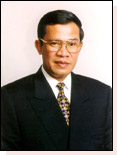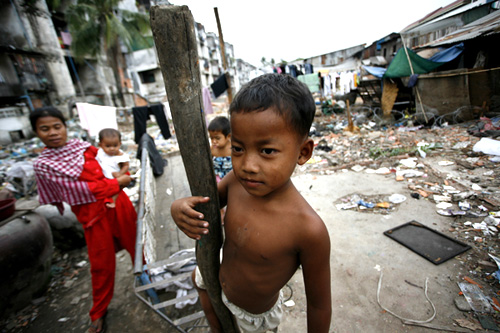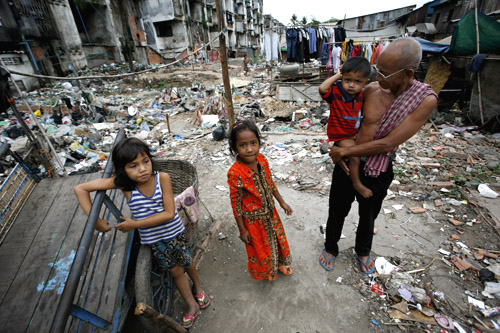While land rights are perhaps the most important issue facing the people of Cambodia today, the subject has received very little international attention. But for this country of 14 million, where widespread corruption and cronyism are seemingly devoid of pretense, the lack of an effective international monitoring system has allowed government ministers and the upper class to essentially rob the country blind of its land and natural resources.
The most notable figure facing corruption allegations is Cambodian Prime Minister Hun Sen, singled out in a July 2007 report by watchdog Global Witness for his links to various illegal logging and development projects.
According to the report, the most powerful logging syndicate in Cambodia, the Seng Keang Company, is run by relatives and close friends of Hun Sen, his wife Bun Rany, and other senior government officials. The Seng Keang Company, notably, has been accused of massive illegal logging in the Prey Long forest generating millions of dollars annually. Rather than take stock of this information, the government banned the Global Witness report shortly after its release.
International donors like the World Bank, responsible for more than $600 million in annual aid to Cambodia, also share a margin of blame for the country’s failure to clean up corruption.

Year after year the Cambodian government pledges to reform, but in the absence of sustained pressure from donors, it consistently shrugs off the responsibility of enacting any legitimate change. In this opportunistic environment it has become commonplace for senior government officials to grant illegal contracts to private corporations owned by friends and relatives under the pretense of development.
The latest community to come under threat in Phnom Penh is Dey Krahorm. Situated on approximately 4 hectares of land in the heart of the city, Dey Krahorm has an estimated value of $44 to $58 million.
In 2005, 7NG company, which has ties to Canadia Bank, obtained an illegal agreement to develop Dey Krahorm. Since that time, 7NG has moved forward with a policy of trying to force out residents through means of intimidation, coercion, deceit and physical violence resulting in the destruction of housing and property.
In recent years the Cambodian government has forcibly evicted a number of communities in Phnom Penh, claiming the land is owned by private companies or needed for development projects. Many of the residents in these communities have lived in their homes for well over a decade. According to Cambodia’s Land Law, if a person has lived on land peacefully for more than 5 years, prior to 1997, they have a legal right to that land.

After being evicted, displaced families are dumped at a relocation sites long distances outside of Phnom Penh in areas that lack running water, sanitation facilities, houses, electricity and schools.
Oung Chou, 25, is one of the residents still holding out at Dey Krahorm. "7NG wants our land but they don’t want to give enough money to the people who live here. They want to take the land for free," Chou says. "We cannot buy a new flat with the money they want to give."
While land is valued at $1,000-$2,000 per square meter in Phnom Penh, companies like 7NG generally offer only $500 to $6,000 for an entire plot.
If Chou, who earns roughly $30 per month, was forced to move outside the city she would have no opportunity for work. "Here we can do everything: work, help our family, have a small shop. It’s easy to get a job in the city," she says "If we have to go out of the city, it is very difficult. There are no jobs, no schools, no homes."
David Pred, Country Director for Bridges Across Borders, an NGO that provides legal assistance to victims of land disputes and forced evictions in Cambodia, echoed Chou’s concerns. "None of these people want to live 20km outside the city. Their livelihoods are here," explained Pred. "The government is systematically removing the poor from Phnom Penh. But the poor are so important to this city’s economy. The government doesn’t realize that."
"There is also a major problem with community activists who try to help their communities to advocate for their land rights being unjustifiably arrested, prosecuted and imprisoned. Usually, the clear intention is to remove the leaders of the community so that the community is weakened and more likely to give up their land without any struggle," explains Naly Pilorge, Director of the Cambodian League for the Promotion and Defense of Human Rights (LICADHO), an NGO that works to promote respect for civil and human rights in Cambodia.
Unfortunately, people like Chou don’t have the freedom to openly protest without the threat of repercussions. "Authorities are very reluctant to permit victims of land grabbing to publicly gather to demand that their land rights be respected, and to seek help from government, parliament or judicial bodies," said Pilorge. "Cambodia’s courts are notoriously corrupt and cannot be relied upon to protect the rights of poor people from abuses committed by rich or influential people."
Though Dey Krahorm is just one of many communities under threat, the circumstances surrounding 7NG’s illegal acquisition of Dey Krahorm are highly indicative of the overall lack of land rights in Cambodia.
Pred has also worked extensively on the high profile Mittapheap eviction case in Sihanoukville where, on April 20, 2007 military and police violently evicted residents, beating them with clubs and leaving several unconscious. In the end, 106 homes were razed to the ground, thirteen villagers were arrested, and the remaining residents were relocated to a vacant site with absolutely no infrastructure in place.
"This forced eviction took place without any semblance of legal authority and represents a gross and criminal violation of human rights," said Pred. "Mittapheap was not relocated. The authorities just burned down their village and made them homeless. They have camped out on the road in front of their village on their own, awaiting the return of their land or adequate relocation."
"Cambodia is a nation of squatters," explains David Pred. "But the biggest squatters are the elite, the military generals, the people who’ve grabbed thousands of hectares of land and sold it off in bits and pieces."
 By January 2007, more than 943,000 hectares of land in 15 rural provinces in Cambodia had been granted to private companies as economic land concessions. This constitutes approximately 5.2% of the total land area in Cambodia, or 14.5% of the country’s arable land. Thirty-six of these 59 concessions were granted in favor of foreign business interests or prominent political and business figures.
By January 2007, more than 943,000 hectares of land in 15 rural provinces in Cambodia had been granted to private companies as economic land concessions. This constitutes approximately 5.2% of the total land area in Cambodia, or 14.5% of the country’s arable land. Thirty-six of these 59 concessions were granted in favor of foreign business interests or prominent political and business figures.
According to Cambodia’s Land Law economic land concessions cannot exceed 10,000 hectares. Nine concessions, however, exceed this limit, the most notable of which are those granted to Pheapimex Co Ltd (315,025 hectares), Green Sea Industry Co Ltd (100,852 hectares), and Green Rich Co Ltd (60,200 hectares). In several cases, senators have acquired interests in two or more concessions under different company names which together exceed the 10,000 hectare limit.
"The law should be followed," said Pilorge. "If concessions of more than the allowed maximum are given, then clearly this makes a mockery of the law."
But in Cambodia, where corrupt politicians hold the keys to the courtrooms, the voices of the poor are seldom heard. And as government, corporate, and foreign interests line up behind illegal logging and development projects, the possibility that justice will prevail grows increasingly dim.
Photos of Dey Krahorm by Will Baxter.
